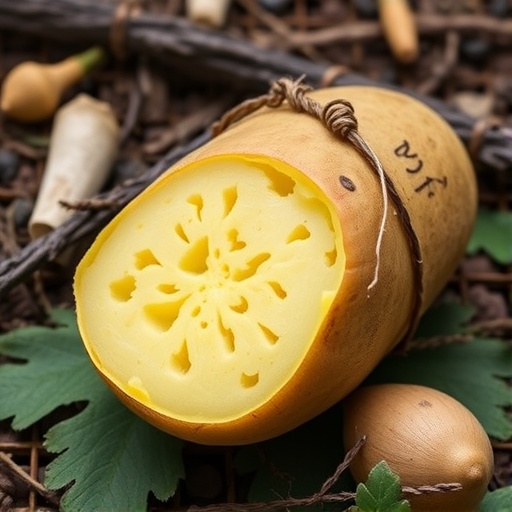In the realm of agriculture, combating plant diseases effectively while minimizing reliance on chemical pesticides is paramount. Recent research by Pasha et al. highlights a promising biocontrol agent, Bacillus subtilis WL2.3, which has shown remarkable potential in controlling Phytophthora infestans, a notorious pathogen responsible for potato blight. This study underscores the urgent need for sustainable practices within the agricultural sector, particularly as the world faces increasing food security challenges.
The significance of this research lies not only in its potential to preserve crop yield but also in its implications for environmental safety. Chemical fungicides, while effective, often lead to soil and water contamination, adversely impacting ecosystems and human health. The introduction of Bacillus subtilis WL2.3 presents an eco-friendly alternative that could enhance agricultural resilience. The findings from this study promise to transform conventional farming practices by integrating biological control into plant disease management strategies.
Pasha and colleagues conducted a series of rigorous laboratory and field trials to evaluate the efficacy of Bacillus subtilis WL2.3. The pathogen, Phytophthora infestans, remains a formidable adversary for potato farmers globally due to its rapid reproduction and adaptability. By utilizing the biocontrol properties inherent in Bacillus subtilis, researchers observed a significant reduction in disease incidence and severity. The results not only highlight the agent’s potential but also encourage further exploration into its mechanisms of action.
The appeal of using Bacillus subtilis WL2.3 lies in its capacity to enhance plant immunity. This bacterium produces various bioactive compounds that stimulate plant defense mechanisms, enabling potatoes to mount a more robust response against pathogenic attacks. The phenomenon, known as induced systemic resistance, can lead to long-lasting protection within the plant, showcasing an innovative way to bolster crop resilience against recurring diseases.
The study also examines the compatibility of Bacillus subtilis WL2.3 with other agricultural practices, including its non-toxic nature when applied alongside standard fertilizers. This characteristic is crucial, as it ensures that farmers can seamlessly incorporate this biocontrol agent into their existing routines without the risk of adverse interactions. Given the potential for widespread adoption, these findings could reshape the paradigms by which farmers manage fungal diseases.
As the research progresses, Pasha et al. emphasize the need for regulatory considerations regarding the commercial application of Bacillus subtilis WL2.3. The authors point out that thorough risk assessments and adherence to safety guidelines will be essential to ensure that this biological agent is both effective and safe for widespread agricultural use. Engaging with regulatory bodies early in the process can facilitate quicker pathways to commercialization and practical application in farmers’ fields.
Moreover, the university’s collaboration with agricultural extension services aims to inform and educate farmers regarding innovative biocontrol methods. By providing workshops and resources, they intend to bridge the information gap that often exists between research findings and practical implementation. As with any novel agricultural practice, farmer acceptance and understanding are pivotal for its success in combating diseases like potato blight.
There is also a significant economic incentive for utilizing biological control agents like Bacillus subtilis WL2.3. Crop losses due to Phytophthora infestans can be devastating, leading to financial strain for farmers. By reducing dependency on chemical fungicides, farmers could considerably lower their production costs while also reducing the financial risks associated with potential crop failures caused by pathogens. This dual benefit could lead to greater profitability and sustainability in potato farming.
Furthermore, the implications of this research cut across global agricultural practices. Regions heavily impacted by potato blight, such as parts of Europe and North America, would benefit immensely from implementing biocontrol strategies. As climate patterns evolve, the pressures on crops due to shifting climatic conditions will require adaptive solutions that extend beyond traditional approaches.
In conclusion, the innovative work presented by Pasha et al. is not merely an academic exercise but a pivotal step towards revolutionizing how agricultural systems can fortify themselves against diseases. By harnessing the natural capabilities of Bacillus subtilis WL2.3, this study affirms that effective and sustainable solutions exist to combat plant pathogens, ensuring food security for generations to come. The integration of such biocontrol agents into mainstream agricultural practices could lead us toward a more sustainable and resilient future in farming.
As we anticipate the widespread adoption of Bacillus subtilis WL2.3 and similar biocontrol agents, the agricultural community must remain vigilant in monitoring outcomes and impacts. Further studies will be essential in understanding the long-term viability and effectiveness of such innovations. The success of this initiative relies not only on scientific advancements but also on the collaborative efforts of researchers, farmers, and regulatory bodies to realize the full potential of sustainable agriculture.
This study, set to be published in the International Microbiology journal in late 2025, could serve as a beacon of hope for plant protection strategies worldwide. The findings inspire ongoing dialogue about the importance of sustainable agricultural practices as we navigate the complex challenges of modern farming.
With growing awareness and investment in biological control methods, the dialogue surrounding agricultural sustainability is becoming more robust. The confluence of innovative research and agricultural practice signifies a promising future, where pathogens like Phytophthora infestans may be met with effective biological antagonists instead of chemical solutions.
Subject of Research: Biocontrol potential of Bacillus subtilis WL2.3 in mitigating Phytophthora infestans infection in potatoes.
Article Title: Biocontrol potential of Bacillus subtilis WL2.3 in mitigating Phytophthora infestans infection in potatoes.
Article References:
Pasha, A.R., Sultan, S., Tabassum, B. et al. Biocontrol potential of Bacillus subtilis WL2.3 in mitigating Phytophthora infestans infection in potatoes. Int Microbiol (2025). https://doi.org/10.1007/s10123-025-00756-2
Image Credits: AI Generated
DOI: 28 November 2025
Keywords: Bacillus subtilis, Phytophthora infestans, potato blight, biocontrol, sustainable agriculture.




